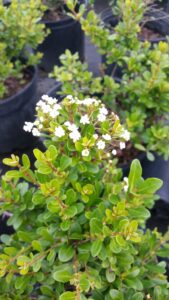S & J Nursery’s Guide to Growing
Viburnum Walter’s Whorled Class
( Viburnum Obovatum “Walters Whorled Class” )
in the Northeast Florida, Jacksonville | St. Augustine area Landscape
Viburnum Walters Whorled Class Origins:
-Viburnum Obovatum is a Florida Native plant. Viburnum Walter’s Whorled Class is a lower growing selection or cultivar of that Florida native shrub.
Viburnum Walter’s Whorled Class Preferred Exposure:
– Viburnum will tolerate full sun to partial sun situations in the North Florida | Jacksonville | St. Augustine areas gardens and landscapes. Viburnum Walter’s Whorled Class is said to even tolerate shade.
Viburnum Walter’s Whorled Class Foliage:
-Small evergreen foliage makes this hardy shrub an excellent choice to add some foliage texture to the landscape. Small leaves area deep dark glossy green color with red tinged new growth.
Viburnum Walter’s Whorled Class Soil Preference / Salt tolerance:
– Viburnum Walter’s Whorled Class will tolerate well drained to moist soils and is not particular about the makeup or content of that soil. It tolerates clay, sand, loam acidic or alkaline conditions equally well.
– Walters Viburnum Mrs. Schillers Delight has a high salt tolerance and can be planted on coastal properties.
– Drought tolerant landscape selection.
Viburnum Walter’s Whorled Class Size Variance:
-Viburnum Walter’s Whorled Class can reach sizes of 4-6+ feet high | 4-6+ feet wide
Viburnum Walter’s Whorled Class Growth Habit:
-Compact growth habit tends to be rounded.
Viburnum Walter’s Whorled Class Growth Rate:
-Viburnum Walter’s Whorled Class shrubs are a moderate to fast growing dwarf selection of Viburnum Obavatum.
-Viburnum Walter’s Whorled Class Bloom:
-Plants bloom heavily in spring and are covered with small white clusters of
flowers. Blooms sparadically during the summer months as well.
Viburnum Walter’s Whorled Class Water Requirements:
– Viburnum Walter’s Whorled Class tends to be drought tolerant once established in the landscape.
Best Uses For Viburnum Walter’s Whorled Class:
– Viburnum Walter’s Whorled Class is a great choice for a midsized shrub for foundation plantings around homes. Use them in masses as the middle or background plant in shrub borders around a home or in groups as a beautiful flowering accent around a tree or even to screen out the view of a
water meter or cable box in the landscape. The small textured leaves and almost always in bloom flowering habit make it an eye catching easy care landscape selection.
– Low maintenance landscape plant.
Care of S & J Nursery’s North Florida | Jacksonville | St. Augustine Shrubs:
– Shrubs can be planted in the North Florida | Jacksonville | St. Augustine area at any time during the year. In normal and well draining soils dig the hole as deep as the root ball and two to three times as wide. Plant the top of the root ball level or slightly higher than the surrounding soils. When planting in poorly drained soils make sure to plant your shrubs a minimum of 3 inches ABOVE the surrounding soil level.
– Water every day during the establishment period. For most 3 gallon size shrubs in the North Florida landscape in average soil, that is neither heavy clay that holds water or really sandy that will take 2-3 weeks of daily watering to ensure that your newly planted shrub will begin to put out new roots and grow into its new home happily. After the first few weeks begin tapering back your watering to every other day then every third day and so on until your newly planted items are flourishing without your assistance.
– If planting larger shrubs you may need to extend the initial care a bit longer to protect your investment and get your shrubs off to the best start possible.
– IMPORTANT: If planting shrubs in heavy clay soils that hold allot of water after a rain or irrigating, remember to check the soil for moisture by sticking your fingers into the soil near the root ball of the newly planted shrub down to 2-3 inches. If it remains wet from the previous watering wait for the top 2-3 inches to dry out before watering again.
– IMPORTANT: When planting shrubs into poor sandy soils be sure to amend the planting hole by mixing compost or cow manure etc. with the native soil that will go back in the hole around the new plants root ball when installing your shrub material, this will not only give your new shrubs good soil to grow its new roots into but help it hold water.
– When planting shrubs from containers be sure to loosen the roots as much as possible pulling loose roots away from the root ball before installing your new plants, if the roots are to tight to easily loosen with your hands use a knife to cut a few slits into the root ball being careful to go all the way from the top to the bottom and making the cut at least an inch deep. This will ensure that your plant will immediately begin to form new roots into its new surrounding soil.
– Mulch newly planted shrubs whenever possible.
– Fertilize each spring with a shovel full of compost or a mixture of Milorganite and a slow release poly coated plant food such as Osmocote or Stay Green general purpose plant food, sprinkling the fertilizer around the mulch circle underneath the foliage of the tree
– Prune as needed to shape each spring and or summer.

